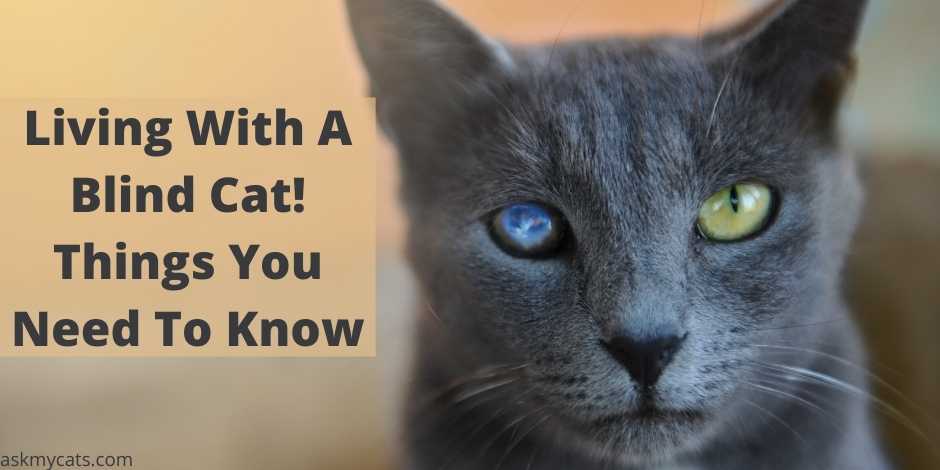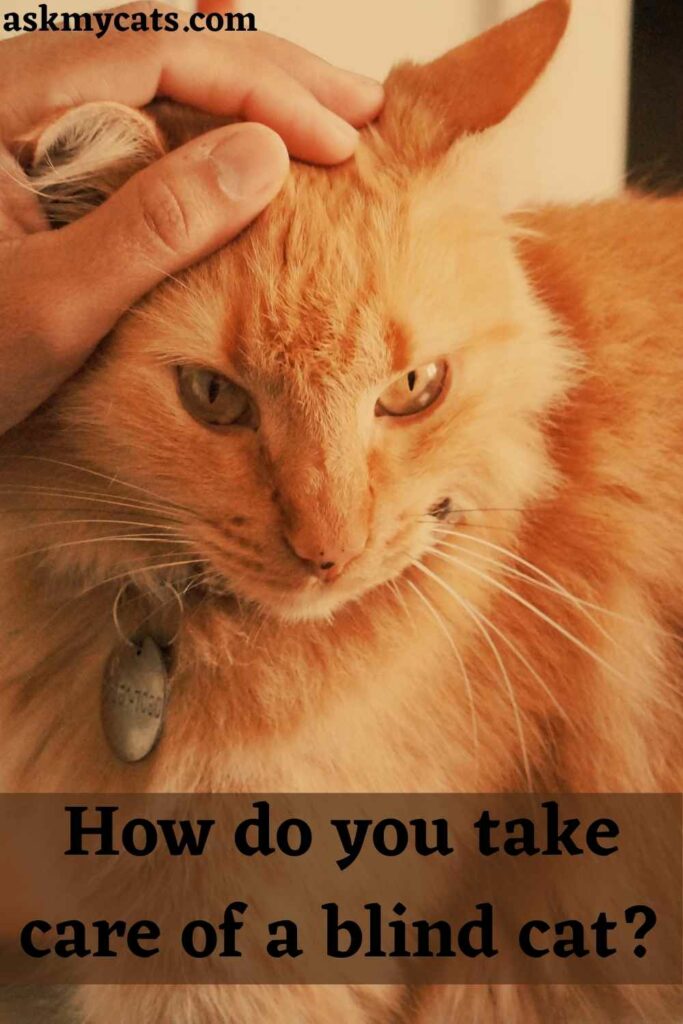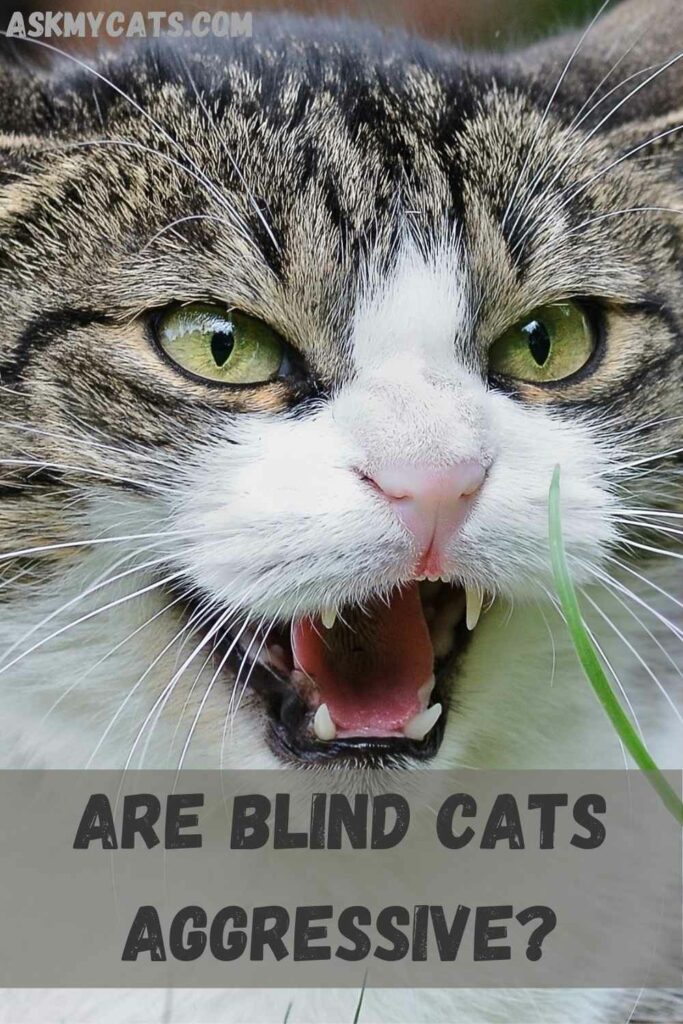Most blind cats can live a happy and fulfilled life if the right conditions are provided to them.
Whether your cat was born blind or lost sight over time, it is possible to give them a healthy life with some minor tweaks and adjustments. In return, they will make sure to shower you with their love and affection.
This article will tell you all about what you have to do to provide the best environment for your blind cat.


Give Your Cat the Perfect Day
Get the Free Ebook!
How Do You Take Care Of A Blind Cat?
There are many ways to take care of your blind cat and keep it engaged. Namely, don’t change the environment; give them time, keep them engaged, startle them and provide extra attention.

Let us talk about the points mentioned above in detail: –
1. Avoid Changing The Environment
Make sure you don’t make any major changes to your home, as new furnishings can be dangerous to your cat, especially if your cat has a proclivity towards jumping or climbing.
The blind cat will have to reconstruct an internal map of its surroundings.
Getting to know different portions of the house in a different way than when their eyesight was normal.
It’s preferable to use their toilet or litter box as a point of reference. Bring your cat to the litter box before allowing them to explore the rest of the house.
It will be beneficial if your cat can always find a toilet, no matter where they are. Make it a habit to do this every morning.
It may be beneficial to use powerful pheromones to “scent” significant objects for the cat to help its nose “see” what it is seeking. Essential oils are particularly irritating to cats’ lungs, and many are dangerous.
Please do not use them to mark your cat’s habitat.
You might start by putting the litter box in a smaller room. You can open new rooms in other parts of the house for the cat to map out as they learn how to move securely in that space.
One alternative for making learning new areas easier is to place small bits of their favourite goodies along the trail that will lead them to the food bowl.
2. Be Patient
Cats are quite independent animals, so you’ll have to be patient while helping them. They will adjust to their new lifestyle over time.
The transition for any cat is much easier if the visual loss occurs gradually. And, by the time your cat loses their eyesight totally, it will be able to navigate its surroundings with ease.
If the visual loss occurs unexpectedly, however, adaptation will take significantly longer. If this is the case, try to remain calm and collected, as pet disabilities can be overwhelming for owners as well as their pets.
3. Keep Them Engaged
Changes in your cat’s eyesight do not imply a change in its behaviour. Blind cats still want to play, interact, and run. Playtime is particularly vital for blind cats, who love it as much as any other cat.
Several noisy toys are available, including balls with bells, that engage their hearing and scent capabilities. Remember to close off access to potentially dangerous products and areas of the apartment, such as the stairs, toilet, drapes, and patio, to avoid injuries.
Bubble wrap the sharp edges of your furniture until your cat learns to avoid them. To prevent falls, use baby gates to block off steep stairwells.
4. Do Not Startle Them
Blind cats are frequently startled and can be particularly sensitive to loud noises. Because the sounds are unexpected, sounds like unlocking and opening doors can be particularly upsetting.
When you enter the house or room, greet your cat and gently stroke its back or neck—notifying them that it is you and that they should not be alarmed.
Some cats are still able to perceive light, so turning on a light when you enter the room can help.
5. Extra Attention
Make an effort to speak with your cat as much as possible so that the tone of your voice provides comfort and aids in the creation of a new mental map of space.
Also, leave your TV or radio on when you’re not at home; the sounds they make will aid them in orienting themselves in the house.
As your cat’s vision deteriorates, its personality and behaviour may alter. Some cats become increasingly reliant on their owners and become “clingy”—that is, they will treat you as a guide, stand near to you, and follow you about.
To help your cat maintain track of your whereabouts, make it a practice to speak to it when you enter or leave a room.
Are Blind Cats Aggressive?
Not necessarily. It is not true that all blind cats are aggressive. Several reasons could be responsible for a cat’s aggression like petting aggression, play aggression, territorial aggression, redirected aggression, and gradual blindness-related aggression.

Let us further analyse these different types of aggression: –
1. Petting Aggression
While some cats crave nothing more than to be petted and cuddled, others are on the fence.
Especially when the cat is blind. Blind cats tend to be easily scared or startled. They might like a little petting, but not too much.
The amount of attention a cat can tolerate varies from one cat to the next.
If you continue touching your cat, they will lash out. If you ignore these indicators, your connection with your cat will suffer because you will be afraid to pay attention to her, and she will not appreciate you for not respecting her boundaries.
If this has ever happened to you when snuggling with your cat, be aware of the following warning signs:
- Body stiffening
- twitching or beating of the tail
- Her body shifted, indicating restlessness.
- Moving her head in the direction of your hands
- Turning back the ears
- Low growls, hisses, and harsh meows are examples of vocalisations.
Stop touching your cat and take your hand away if she exhibits any of these behaviours. Don’t touch her again if she wants to stay on your lap; respect her demand to be left alone.
2. Play Aggression
While it’s entertaining to watch cats play rough with one other or toys, it’s not so much fun when our hands and other body parts get hurt.
Kittens are simply displaying instinctual predator behaviour, and they are unaware that you should be revered rather than devoured.
Even older blind cats can get carried away when playing, and because they have stronger jaws and claws than kittens, you might sustain serious damage.
It’s difficult to educate blind cats to cease playing rough during playtime. Still, with persistent redirection and the provision of engaging toys that both you and your kitten will like, she will eventually understand.
3. Territorial Aggression
Cats can be very territorial, and the same is true for blind cats. However, some take this a step further and display territorial aggression.
Here are some typical territorial cat behaviours:
- As the intruder approaches, lashing out.
- She’ll stand in a doorway and growl at you if you get too close
- she will Attack her ostensible intruder.
A territorial cat can be dealt with in a variety of ways. The first is training. Because she is trying to earn incentives, a trained cat will defer territorial problems to you. A well-trained cat is more at ease and in sync with the rest of the family.
4. Redirected Aggression
This form of hostility is frequently territorial in nature. It’s frequently induced by an outside stimulus, such as a cat or other animal she didn’t like that she heard or smelled through the window.
Your cat’s behaviour is akin to blind fury, as she becomes so agitated that she lashes out at the first object she notices.
Many cats can become fixated on something outside the window that arouses them, such as the smell or sound of a bird, rat, dog, or cat, or even the movement of leaves.
She is completely unconscious of anything around her after she has been triggered, even your presence.
If you notice these actions in your cat, either completely avoid her or clap your hands loudly to disturb her mood. Remove a toy or two from your grasp. Never come close to her.
5. Gradual Blindness Related Aggression
Cats that are gradually losing their vision, whether due to age or another medical issue, have a tendency to hide in a small dark space or lash out when you least expect it.
Other indicators of sickness are frequently present, but felines are adept at concealing their condition.
Keep an eye out for the following:
- Lack of desire to be noticed.
- Hiding in a dark, confined space.
- Aggressive against other pets and family members in the house.
- Constant yowling or meowing
- An overall hunched look, a greasy appearance to her coat.
Any of these behaviours should prompt you to take your cat to the veterinarian right away. A physical ailment is the most typical cause of abrupt onset hostility.
Why Do Blind Cats Walk In Circles?
Blind cats can walk in a circle due to loss of direction because of recently becoming blind or some other underlying medical condition.

If the cat has recently gone blind, it can walk in circles even though it is rare.
This could happen as they lose the sense of direction because of the lost vision and cannot use their other senses such as nose and whiskers.
However, if this is not the case or your cat had been blind for a long time but suddenly started walking in circles, this could be because of some medical condition.
Circling in the same direction can be a sign of a brain injury. Tumours, viruses, infections, and other brain illnesses can affect cats. The prognosis may be bleak if this is the case.
Inner ear infection in an older cat might cause them to circle, tilt their head, and have irregularities with their eyes.
If this is the case, the prognosis can be significantly improved.
In any case, you must immediately take him to the veterinarian. Some of the probable disorders have treatments, and even if there isn’t a cure, there are medications that can halt the advancement of the disease and keep him more comfortable for longer.
How To Get A Blind Cat To Drink Water?
You can get a blind cat to drink water by placing a mat near the water bowl as this can help associate that the change of surface means that the water is near.
Putting a mat underneath the water bowls or small slide pads leading up to the water bowls will assist the cat feel like he’s coming closer to the water bowl.
On the other hand, a cat fountain may be more beneficial because the cat can hear it, and the water is always moving, encouraging cats to drink water. You can buy one of those for about $30.00.
Can A Blind Cat Find Its Way Home?
A blind cat will probably not be able to find its way back home, as it has the mapping of your house and not the outside.
Ensure that your pet is properly identifiable. If your pet becomes separated from you, a collar and microchip are essential. Your blind cat will most likely be unable to find her way home if she becomes separated from you.
Determine whether or not your cat is blind. Put a medical alert tag on your pet’s collar that states she’s blind and has your contact information on it.
Frequently Asked Questions
Can a cat go blind because of old age?
Ans. Yes, a cat can go blind because of old age. High blood pressure is one of the most common causes of sudden blindness in an aged cat, also known as hypertension. The increasing pressure pulls the light-sensitive layer (retina) away from the rear of the eye, which can happen in a matter of seconds.
Can a cat go into depression because of lost sight?
Ans. No, cats don’t usually go into depression because of lost sight. Instead of feeling sorry for themselves, they tend to adapt to the situation quite swiftly if the right environment is provided.
Should I put a microchip in my blind cat’s collar?
Yes, you must put a microchip in your blind cat’s collar, as this will be the only way to bring your cat back if she wanders outside and cannot return.
Final Words
There are many ways that you can train your blind cat and make her feel less stressed and happier, allowing her to live a fulfilled life.
Above all, continue to adore your cat as you have in the past since this will make her feel less stressed and more comfortable in her new form. This can be an excellent time to strengthen your bond with your cherished furball.

Since our cat became blind she has learned to navigate fairly well. However she has started to meow very loudly…as she gets back into the area she sleeps. This continues fow few seconds then she will go lay down. Is she stressed or other?
One possible reason might be that she can’t find her litter box or her sleeping area properly. She is probably stressed and needs some reassurance.